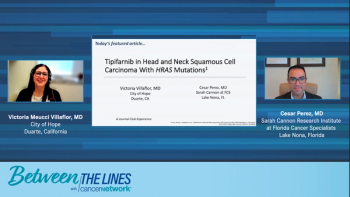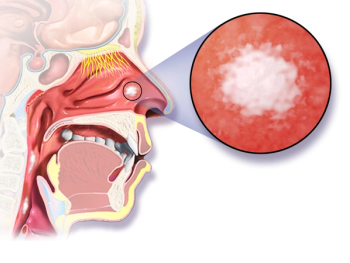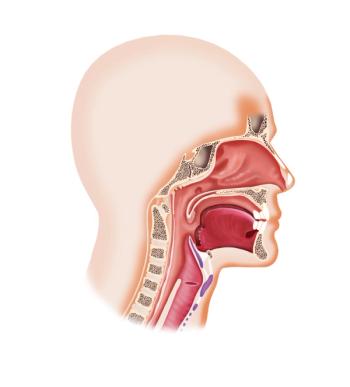
A priority review was granted to toripalimab by the FDA for 2 indications in patients with advanced nasopharyngeal carcinoma.

Your AI-Trained Oncology Knowledge Connection!



A priority review was granted to toripalimab by the FDA for 2 indications in patients with advanced nasopharyngeal carcinoma.

The significance of studying strategies that target HRAS mutations in head and neck squamous cell carcinoma.

Patients with human papillomavirus–associated oropharyngeal squamous cell carcinoma experienced good quality of life and promising survival benefit after being treated with de-escalated adjuvant radiation therapy.

Patients with human papillomavirus–associated oropharyngeal squamous cell carcinoma experienced efficacious survival benefits from treatment with primary radiotherapy.

Key takeaways from a paper that evaluated the efficacy of tipifarnib in recurrent and/or metastatic mHRAS head and neck squamous cell carcinoma.

A phase 2 trial examining the use of small molecule immunomodulator EC-18 in patients with head and neck cancer experiencing chemoradiation-induced oral mucositis met its primary and secondary end points.

Drs Cesar Perez and Victoria Meucci Villaflor review “Tipifarnib in Head and Neck Squamous Cell Carcinoma With HRAS Mutations” by Ho AL, et al.

Patients with recurrent/metastatic head and neck squamous cell carcinoma and a PD-L1 combined positive score of 1 or more and 20 or more experienced a clinical benefit with first-line nivolumab plus ipilimumab compared with the EXTREME regimen.

The association between current human papillomavirus vaccination trends and incidence of oropharynx cancer will be modest over the next 25 years.

Ficlatuzumab, which received a fast track designation from the FDA, may provide benefit to patients with relapsed or recurrent head and neck cancer.

The first patients with human papillomavirus 16–positive oropharyngeal cancer have been dosed with ISA101b, which was given a fast track designation by the FDA, as part of a phase 2 study.

The anti-PD-1 antibody spartalizumab demonstrated promising responses in patients with recurrent/metastatic nasopharyngeal cancer.

Patients with advanced nasopharyngeal carcinoma and who were treated with gemcitabine plus cisplatin experienced a longer overall survival and improved progression-free survival vs fluorouracil plus cisplatin.

Investigators identified an improvement in median progression-free survival among patients with recurrent or metastatic nasopharyngeal carcinoma who were treated with camrelizumab plus gemcitabine and cisplatin vs placebo plus gemcitabine.

Toripalimab in combination with chemotherapy yielded an improvement in progression-free survival compared with placebo plus chemotherapy in patients with recurrent or metastatic nasopharyngeal carcinoma.

Patients with head and neck cancer who live in rural counties are 50% more likely to die from suicide compared with individuals residing in urban or metropolitan areas.

Data from a phase 2 clinical trial with pembrolizumab and cetuximab yielded promising clinical activity in patients with recurrent or metastatic head and neck squamous cell carcinoma.

Eric J. Sherman, MD, highlights several drugs that are being used to treat RET-positive thyroid cancer.

Eric J. Sherman, MD, examines the phase 3 COSMIC-311 trial with cabozantinib in radioiodine-refractory differentiated thyroid cancer.

Eric J. Sherman, MD, highlights trends he observed with immunotherapy in the head and neck cancer space.

Eric J. Sherman, MD, of Memorial Sloan Kettering Cancer Center highlights research on adjuvant capecitabine in nasopharynx cancer.

Patients with long-term oropharyngeal cancer were surveyed regarding factors leading to severe effects on voice and speech.

Results of the phase 3 JUPITER-02 trial presented at ASCO 2021 support the use of toripalimab plus chemotherapy for recurrent or metastatic nasopharyngeal carcinoma.

A new treatment arm of a phase 2 trial examining PDS0101 plus pembrolizumab in patients with HPV-related head and neck cancers will be opened to patients with immune checkpoint inhibitor–pretreated disease.

Penpulimab may be a future treatment option for patients with nasopharyngeal cancer in the third line of therapy dependent on success of a recent biologics license application submitted to the FDA.